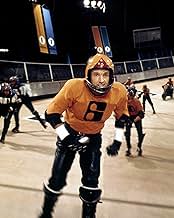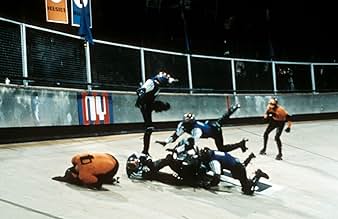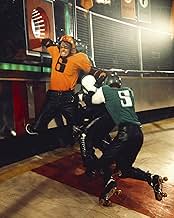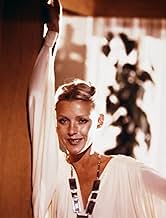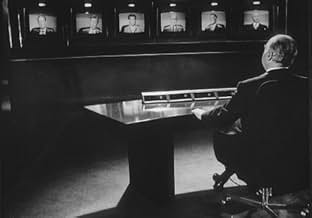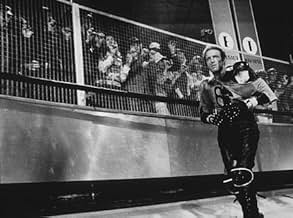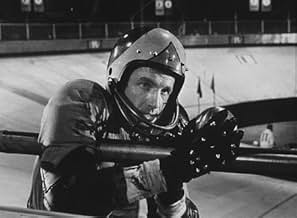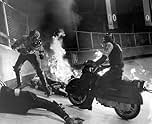Dans un avenir contrôlé par les entreprises, un sport ultra-violent connu sous le nom de Rollerball est suivi par le monde entier alors qu'un de ses puissants athlètes est prêt à défier tous... Tout lireDans un avenir contrôlé par les entreprises, un sport ultra-violent connu sous le nom de Rollerball est suivi par le monde entier alors qu'un de ses puissants athlètes est prêt à défier tous ceux qui veulent le mettre hors jeu.Dans un avenir contrôlé par les entreprises, un sport ultra-violent connu sous le nom de Rollerball est suivi par le monde entier alors qu'un de ses puissants athlètes est prêt à défier tous ceux qui veulent le mettre hors jeu.
- Victoire aux 1 BAFTA Award
- 4 victoires et 5 nominations au total
- Bartholomew's Aide
- (as Rick Le Parmentier)
- Madrid Biker #1
- (non crédité)
- Houston Team Rookie
- (non crédité)
- Biker
- (non crédité)
Avis à la une
But, what am I trying to say?. Rollerball, folks, is one of the most perfect examples of the good/evil infinite fight. One man alone, discovering the truth behind is comfortable life, losing is goods and privileges, gets himself in a life-or-dead final battle against the real enemy: the Corporation (¿who else?). The image of James Caan skating alone into the game arena with the crowd claiming his name louder and louder is simply unforgettable. GREAT movie.
And remember: Take care, there are many powerful Corporations around you.
I had some vague notion of the storyline, but I tried not to read the case or liner notes and take in the movie on a first impression. Released in the summer of 1975, there are definite and readily apparent influences of earlier films, not the least of which being Stanley Kubrick's "A Clockwork Orange." The colors, the film stock, the editing style are all reminiscent of that earlier, similarly-themed master work, yet I don't believe it detracted from this film at all.
Supposedly set in the year 2018 (though this is never established in the movie, that I could tell), corporations have replaced governments and managed to eliminate war, poverty, disease and bad hair days. People don't have too much of a say in what goes on around them, but they're all very physically comfortable. Of course, the violent nature of the human beast must be satisfied, and it is -- in the gladitorial ring of the world's most popular sport, Rollerball. The game consists of two teams (from cities all over the world) skating and motorbiking around a 1/8-mile track, trying to get a steel ball into a goal. As the course of the season progresses, more and more limitations as to what constitutes fair play are removed, and by the final, the melee is total.
James Caan plays the Michael Jordan, Wayne Gretzky and Joe Montana of Rollerball, Jonathan E.. He's the biggest star in the world, but he's also a thinking man, and when the corporation which owns his team wants him to retire, he refuses, wanting to know first why they'd want him to retire when he's playing at his best.
The rest I leave to the viewer to find out. I can only say it is a very well-crafted script with plenty to say about violence, the spirit of the individual man, and the bloodlusts that a happy and idle populace can muster. Very well-filmed with touches of brilliance in editing and framing.
A detraction which really couldn't be helped involves the portrayal of the future. Director Norman Jewison couldn't know what the world of forty years in his future would be like, so he took the wise route of not making it all that different from 1975, but with subtle changes (such as the interesting but impractical "multivision" concept in which all TV sets have a large screen and three smaller screens above it, each showing different but related pictures). The result, though infinitely preferable to lots of neon and superfluous antennae, is that the place looks like 1975 with slightly cooler gadgets. I can't tell you what 2018 will look like, but it won't look like that.
Interestingly, the "corporate inevitability" concept of the future, which I believe Jewison meant earnestly, plays out much more as a satire of the opposite, a communist world. Much of what the coroprate culture says, as personified by John Houseman's Mr. Bartholomew, sounds much like the rhetoric of communism -- people are fed and comfortable and happy, but the individual is beholden to the group at all costs. Indeed, some of the words of description of the culture seem lifted straight from Marx and Engels.
The DVD leaves something to be desired, though. The picture is a lot dirtier than I'd like, especially in still-shot scenes. The color is muted, though this may be part style, and some shots seem positively muddy.
The remastered 5.1 soundtrack is a disappointment. The rear speakers get very little play. One particular effect of note, I must concede, is one moment when you can hear the ball roll all the way around the arena, and it's as though you're standing in the center.
In all, it's an excellent movie, which I can't recommend enough, but if the disc had been any pricier than it was, I would have felt as though I was somewhat taken.
Perhaps after the release of the upcoming remake, there will be a better special edition.
Now, having just watched the movie twice in a night, the second time with the director's commentary, I have finally got to grips with the scenes between the action, and discovered that I like it more than ever. The view of the future is not highly original; tipping its hat to the stratified societies foreseen by Orwell and Huxley, amongst others; but nevertheless the portrayal is engaging. Jewison astutely realised that only by filling in the image of the future society, the characters, and the political background against which the tournament unfolds, would the game be seen as truly REAL for the characters. In the meanwhile, he also has the chance to build suspense, upping the stakes for both the heroic gladiator/combateur Jonathon, and his would-be puppet master Bartholemew. In this way, when we come to watch the actual contests, our enthusiasm is whetted, and by making the rules progressively more dangerous with each passing game, the stakes grow ever higher.
The central themes of the movie are (i) loss-of-soul/nihilism/sensual-vs-spiritual-happiness, and (ii) individuality vs state control. Perhaps the best scenes elucidating these themes are the famous `tree killing' scene, and the conversation between Jonathon and Ella in the forest. The use of imagery and metaphor is widespread; I will mention only the terrific concept of the roulette wheel as game arena, with the players INSIDE, instead of outside; and the Circus Maximus parallel. You may draw many interesting conclusions from this about the director's and writer's intent.
My final word is: watch it once, soak up the action, and be bored by the rest. Then view it again, feel yourself in Jonathon's dilemma, experience his wrenching disappointment with the people in his life who betray him, and try to tear yourself away if you can as he is pushed inexorably to his fate in the arena of ROLLERBALL.
Le saviez-vous
- AnecdotesMany of the extras in the film received an additional wage in order to cut their fashionably long hair so the look of the film would not be tied to the era in which it was made.
- GaffesAt the beginning of the New York game, after many moments in the film where different characters have repeated that there would have been "no time limit", the scoreboard shows the countdown (starting from 20.00).
This is not actually a goof, as the game was still going to have 20-minute periods, but there was going to be no limit to the number of periods, hence "no time limit".
- Citations
Bartholomew: Sweet dreams, Moonpie. That's a bad habit you've got there. You know what that habit will make you dream, Moonpie? You'll dream you're an executive. You'll have your hands on all the controls, and you will wear a gray suit, and you will make decisions. But you know what, Moonpie? You know what those executives dream about out there behind their desks? They dream they're great Rollerballers. They dream they're Jonathan; they have muscles, they bash in faces.
- ConnexionsFeatured in Brubaker (1980)
- Bandes originalesToccata and Fugue in D minor, BWV 565
(uncredited)
Composed by Johann Sebastian Bach
Performed by Simon Preston and the London Symphony Orchestra
Conducted by André Previn
Meilleurs choix
Détails
- Date de sortie
- Pays d’origine
- Langue
- Aussi connu sous le nom de
- Rollerball: los gladiadores del futuro
- Lieux de tournage
- BMW Building, Munich, Bavière, Allemagne(Energy Corporation headquarters)
- Sociétés de production
- Voir plus de crédits d'entreprise sur IMDbPro
Box-office
- Budget
- 6 000 000 $US (estimé)
- Durée2 heures 5 minutes
- Couleur
- Mixage
- Rapport de forme
- 1.75 : 1
Contribuer à cette page




